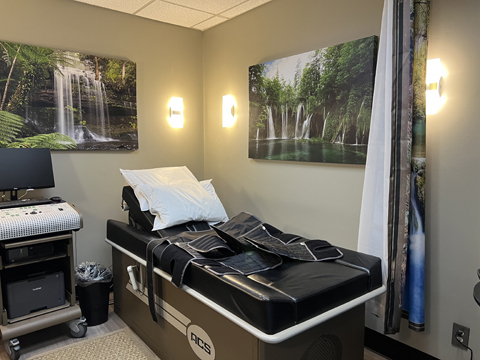For patients with chronic, stable angina, EECP®, or Enhanced External CounterPulsation Therapy, has been shown to provide some relief of chest pain and other symptoms and help patients to increase their daily activities. “EECP Therapy is an option for patients who are not eligible for further interventional treatments for their condition, such as stenting or bypass surgery,” says cardiologist Michael Morrow, M.D. “It is an outpatient treatment available in our office that is usually given for an hour each day, five days a week, for a total of 35 hours. So it does require a significant time commitment from the patient to get the most benefit from the therapy.”
During the treatment, you lie on a comfortable treatment table, in our spa-like EECP Suite, with large blood pressure-like cuffs wrapped around your legs and buttocks. These cuffs inflate and deflate at specific times between your heartbeats. A continuous electro cardiogram (ECG) is used to set the timing so the cuffs inflate while the heart is at rest, when it normally gets its supply of blood and oxygen. The cuffs deflate at the end of that rest period, just before the next heart beat. The special sensor applied to your finger checks the oxygen level in your blood and monitors the pressure waves created by the cuff inflations and deflations. During the therapy, patients relax and watch TV or sometimes nap.
“Studies have shown that 80 percent of patients who complete the full-course of therapy experience symptom relief that may last up to three years,” says Dr. Morrow. “In our practice, we’ve certainly seen many patients who have reported having more energy and who were able to be more active in their daily lives. I think the best testament that EECP therapy can make a difference is when our patients ask about having it again a few years later.” EECP Therapy is covered by Medicare and can be repeated. Not everyone is a good candidate for this type of treatment, however talk with your cardiologist if you’ve already had interventional procedures and your symptoms have returned and your medications no longer relieve your angina or heart failure symptoms. Other medical conditions may prevent you from being a candidate.

